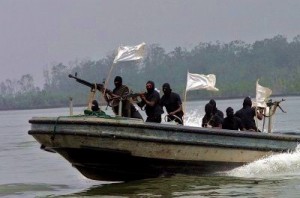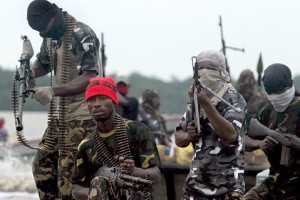Turbulent Times in West African Waters: 5 killed, 19 rescued.
 On Wednesday 17 November, gunmen opened fire on a vessel transporting security personnel to an oil platform in Cameroon waters and killed five people, – ‘Gunmen off Cameroon in Deadly Boat Raid’ in the same day the Nigerian military professed to have rescued nineteen oil-workers that had been kept hostage by militant groups operating off the Nigerian coast – ‘Nigerian Military Free 19 Oil Delta Hostages’.
On Wednesday 17 November, gunmen opened fire on a vessel transporting security personnel to an oil platform in Cameroon waters and killed five people, – ‘Gunmen off Cameroon in Deadly Boat Raid’ in the same day the Nigerian military professed to have rescued nineteen oil-workers that had been kept hostage by militant groups operating off the Nigerian coast – ‘Nigerian Military Free 19 Oil Delta Hostages’.
Piracy off the coast of Nigeria and Cameroon is a combination of armed militant groups, insurgents and organised and opportunistic criminals conducting armed robbery, kidnapping and goods and human trafficking. Around Port Harcourt, Lagos and Douala organised and opportunistic crime is more prevalent whilst further offshore and along the coast attacks are largely attributed to militant groups. Aside from political instability and a lack of law enforcement, the defining factor that all of these types of attacks share are a comparatively high level of violence and resultant crew harm that is largely unseen with piracy elsewhere.
As Steve Phelps explained in his October article ‘Nigeria – Maritime Security, the Reality’ systematically underreported attacks belie the scale of the problem. For example in 2009 the IMB were able to officially record that 28 attacks occurred in Nigerian waters, whilst intelligence groups put the figure closer to 100. Officially reported pirate attacks off the coast of Somalia had an 11% success rate in 2009 yet pirate attacks off the Nigerian coast had a 73% success rate. In reality, with the inclusion of the numerous attacks that go unreported this success rate is reduced, but the high degree of organised violence and threat of violence to crews, the quantity of vessel traffic, the lack of security forces and the vulnerability of the vessels transiting or moored in the area ensure that success rates remain high.
As the Reuters article illuminates, there are divisions within the militant groups that permit openings for Nigerian initiatives like the freeing of these hostages, but the number of attacks are likely to rise as militant groups attempt to undermine President Jonathan’s administration with the forthcoming elections in April 2011.
In Cameroon, armed robberies on vessels off Douala have not been uncommon for several years; however the expansion of pirate activity further offshore has been relatively recent. The kidnappings and killings off Cameroon’s coast that have increased in number since 2008 can be largely attributed to the seceding of the Bakassi region to Cameroon and the subsequent citizen upheaval in the same year. Nevertheless, whilst frequently affecting the movement of civilians, lines drawn on a map are rarely boundaries for militant activity, especially in the maritime sphere. The porous Cameroon-Nigerian border is unlikely to prohibit the political instability and prolific militant activity off the south-eastern coast of Nigeria from having an effect in Cameroon’s waters, especially without effective governance in the border regions.
Outside the waters of  Nigeria and Cameroon, West African piracy largely consists of pirates armed with knives and or small arms boarding vessels at anchor or slow speeds with the intention of the theft of valuable goods, cash and ship stores. Over the last three years successful pirate attacks have been reported in the waters of Angola, Benin, Ghana, Ivory Coast, Liberia, Morocco, Sierra Leone and Togo and attacks have even occurred on vessels underway 60NM off the coast of Guinea and Guinea Bissau, with armed pirates using skiffs to chase and board vessels.
Nigeria and Cameroon, West African piracy largely consists of pirates armed with knives and or small arms boarding vessels at anchor or slow speeds with the intention of the theft of valuable goods, cash and ship stores. Over the last three years successful pirate attacks have been reported in the waters of Angola, Benin, Ghana, Ivory Coast, Liberia, Morocco, Sierra Leone and Togo and attacks have even occurred on vessels underway 60NM off the coast of Guinea and Guinea Bissau, with armed pirates using skiffs to chase and board vessels.


Hi Gary,
Very interesting article. We should get together and catch up. As a Nigerian with a planned dissertation titled “Conflicting views on Militancy in the Niger Delta of Nigeria”, this article raised my eyebrows. Is it really about oil though? I’m in the UK from 13th December for a week. Coffee and a Catch up?
Regards, Saheed Adegbite
Hi Saheed,
I trust all fares well with the OSCE?
Whilst some may be inclined to emphasise the Oil aspect and it is an integral and intractable part of the political puzzle, your question is a pertinent one.
As we have seen in the past, natural resources are useful catalysts for groups with political motives; which is what we have here, in my humble opinion.
In the respect of “Funds and Followers” Oil is a composite element of militant activity. Whilst the attainment and disruption of Oil production in the Niger Delta may not possess the highest priority for the larger militant groups, the current percieved relationship between the energy companies and elements of the political elite can produce the necessary political and economic environment that is conducive to increased militant activity and criminality.
In a nutshell, it is not all about Oil, indeed, depending on which group the effect of this particular element varies widely, but you cannot remove it from the equation. Oil possesses an impact upon the local and international perception of the issues, in spite of governmental and MNC attempts to stifle information flow. What I find interesting is the more recent re-framing of the conflict and proposed linkages with transnational terrorist groups and “militant islam”. Is it really about that?
There is a lot to discuss, so yep I would be more than happy to have a coffee with you and I will contact you by email to arrange that.
All the best,
Gary.
Conflicting views on the causes of the rise of militancy in the Niger Delta region of Nigeria: an analytic consideration.
In most current academic scholarship, the views on what has exacerbated militancy in the Niger Delta region of Nigeria broadly falls under four categories: Economic, Political, Environmental and Social. The political and social arguments look at historical ethnic rivalries and how that affects the current political landscape and political motivations for and against militancy. The combination of economic and environmental focuses on the politics of oil and ‘Dutch disease’ syndrome, revolt against the environment impact, its Human rights implications and the protest against economic deprivation. An initial search on existing literature seems to suggest there is more analysis on the latter than the former. It’s important to see why this is and disprove (or confirm) the extent to which these factors play a role.
The research required to cover all 4 aspects is extensive, so most work tends to focus on the impact of oil politics on security and particularly how it has impacted militancy and looking to see how strong (or weak) the link is with oil. In contrast with a lot of literature, it will be intriguing if we find strong arguments that suggest oil is a red herring and stronger arguments in historical ethnic rivalries or social factors.
There are various International Security and International Relations themes could be highlighted by examining the relevancy in this region as compared to others: for example Oil (and Energy) Security, The Resource Curse, the securitization of environmental degradation and link to rising militancy. A parallel can be drawn with the issue of piracy in Somali. There are also several legal themes within International Law and Human Rights that can be explored with respect to cases between oil giants and companies e.g. Shell and the Ogoni people of the Niger Delta and trials of activists like Ken Saro Wiwa. Another theme, not explored extensively, but relevant in building the picture is the extent to which the failure of diplomacy is a factor in rising militancy and some analysis of various negotiations that have taken place between government and these communities.
Questions that need answers
1. Is the resource curse concept and its environmental and economic impact, often described as causal to the rise in militancy, overplayed in existing academic scholarship on the subject?
2. Who exactly are the Movement for the Emancipation of the Niger Delta (M.E.N.D.) and what are their aims? Other emerging groups? Niger Delta People’s Volunteer Force (NDPVF), the Bakassai Boys, the Coalition for Militant Action (COMA), the Niger Delta Vigilante Force (NDVF) etc.
3. How has ethnicity and past rivalries played a part in the escalation of militancy and is Oil just another stage where long standing feuds are being played out?
4. How different is militancy in the Niger Delta from that in other parts of Africa as a region and other continents for example piracy in Somalia and Militancy/Political Islam in the Arab world?
5. Is crime disguised as militancy and political activism?
What’s the best way to research this?
In addition to reading books and articles on the subject, the analysis of the proceedings of conferences that have been conducted on the subject on the last 10 years as it has grown into a mainstream issue in International Affairs.
It also helps to research newspaper articles, magazines, news on the subject in order to build your own clear timeline of events and actors in the rise of militancy.
Visit Nigeria for 2 weeks in the summer (hopefully it wont be too hot!) with the intention of interviewing academics and government officials that may have been involved in the ongoing attempt to resolve the Niger Delta crisis. The office of the governors of Rivers state, Bayelsa and Niger Delta states are all possibilities. In addition to this closely following the 2011 presidential elections and politics may also be relevant (seeing the incumbent president Goodluck Jonathan, and presidential candidate of the dominant party PDP, is a native of Niger Delta). Various commentators maintain this plays a significant role. The previous president Olusegun Obasanjo dedicated a lot of time negotiating with militants in the Niger Delta and interviewing various acquaintances in that administration of the proceedings of those negotiations will certainly shed a lot of light.
Archived news footage and documentaries on Niger Delta reporting is extensive and these will be reviewed.
The key challenge in this subject will be to bring out a clear academic scholarship analysis with clear IR or Security Studies concepts. Comparison of militancy in Nigeria with say other forms of militancy in other regions where there is more analysis e.g. Islamic militancy and fundamentalism may help. However, such an approach may divert from the focus and must be approached with care so the paper doesn’t end up being too general.
This is what I’ll be spending most of the rest of the year looking at, so keep your eyes peeled for more.